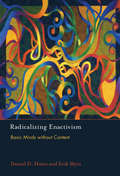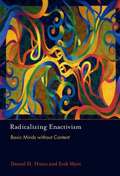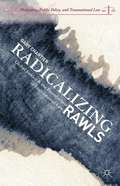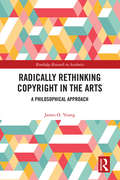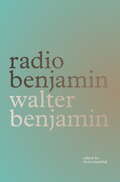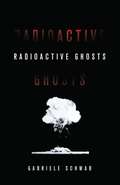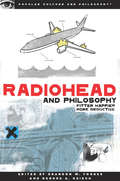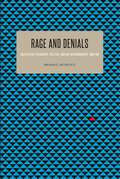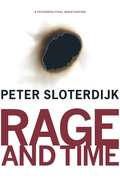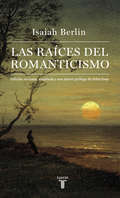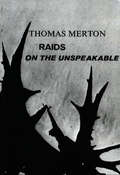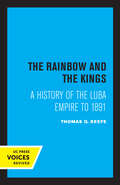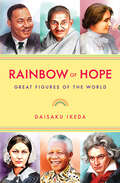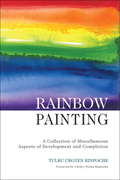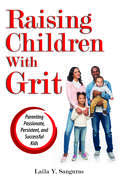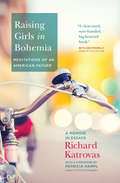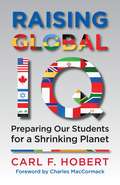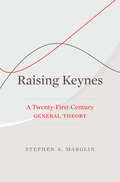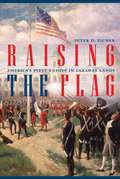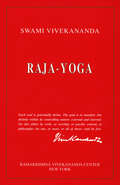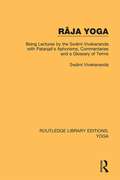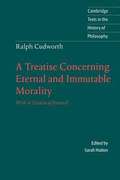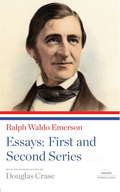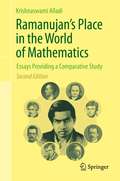- Table View
- List View
Radicalizing Enactivism: Basic Minds without Content
by Daniel D. Hutto Erik MyinA book that promotes the thesis that basic forms of mentality—intentionally directed cognition and perceptual experience—are best understood as embodied yet contentless.Most of what humans do and experience is best understood in terms of dynamically unfolding interactions with the environment. Many philosophers and cognitive scientists now acknowledge the critical importance of situated, environment-involving embodied engagements as a means of understanding basic minds—including basic forms of human mentality. Yet many of these same theorists hold fast to the view that basic minds are necessarily or essentially contentful—that they represent conditions the world might be in. In this book, Daniel Hutto and Erik Myin promote the cause of a radically enactive, embodied approach to cognition that holds that some kinds of minds—basic minds—are neither best explained by processes involving the manipulation of contents nor inherently contentful. Hutto and Myin oppose the widely endorsed thesis that cognition always and everywhere involves content. They defend the counter-thesis that there can be intentionality and phenomenal experience without content, and demonstrate the advantages of their approach for thinking about scaffolded minds and consciousness.
Radicalizing Enactivism
by Daniel D. Hutto Erik MyinMost of what humans do and experience is best understood in terms of dynamicallyunfolding interactions with the environment. Many philosophers and cognitive scientists nowacknowledge the critical importance of situated, environment-involving embodied engagements as ameans of understanding basic minds -- including basic forms of human mentality. Yet many of thesesame theorists hold fast to the view that basic minds are necessarily or essentially contentful --that they represent conditions the world might be in. In this book, Daniel Hutto and Erik Myinpromote the cause of a radically enactive, embodied approach to cognition that holds that some kindsof minds -- basic minds -- are neither best explained by processes involving the manipulation ofcontents nor inherently contentful. Hutto and Myin oppose the widely endorsed thesis that cognitionalways and everywhere involves content. They defend the counter-thesis that there can beintentionality and phenomenal experience without content, and demonstrate the advantages of theirapproach for thinking about scaffolded minds and consciousness
Radicalizing Rawls: Global Justice and the Foundations of International Law
by Gary ChartierThis book is a critical examination of John Rawls's account of the normative grounds of international law, arguing that Rawls unjustifiably treats groups - rather than particular persons - as foundational to his model of international justice.
Radically Rethinking Copyright in the Arts: A Philosophical Approach (Routledge Research in Aesthetics)
by James O. YoungThis book radically rethinks the philosophical basis of copyright in the arts. The author reflects on the ontology of art to argue that current copyright laws cannot be justified. The book begins by identifying two problems that result from current copyright laws: (1) creativity is restricted and (2) they primarily serve the interests of large corporations over those of the artists and general public. Against this background, the author presents an account of the ontology of artworks and explains what metaphysics can tell us about ownership in the arts. Next, he makes a moral argument that copyright terms should be shorter and that corporations should not own copyrights. The remaining chapters tackle questions regarding the appropriation of tokens of artworks, pattern types, and artistic elements. The result is a sweeping reinterpretation of copyright in the arts that rests on sound ontological and moral foundations. Radically Rethinking Copyright in the Arts will be of interest to scholars and advanced students working in aesthetics and philosophy of art, metaphysics, philosophy of law, and intellectual property law.
Radio Benjamin
by Walter Benjamin Jonathan Lutes Lecia RosenthalWalter Benjamin was fascinated by the impact of new technology on culture, an interest that extended beyond his renowned critical essays. From 1927 to '33, he wrote and presented something in the region of eighty broadcasts using the new medium of radio. Radio Benjamin gathers the surviving transcripts, which appear here for the first time in English. This eclectic collection demonstrates the range of Benjamin's thinking and his enthusiasm for popular sensibilities. His celebrated "Enlightenment for Children" youth programs, his plays, readings, book reviews, and fiction reveal Benjamin in a creative, rather than critical, mode. They flesh out ideas elucidated in his essays, some of which are also represented here, where they cover topics as varied as getting a raise and the history of natural disasters, subjects chosen for broad appeal and examined with passion and acuity.Delightful and incisive, this is Walter Benjamin channeling his sophisticated thinking to a wide audience, allowing us to benefit from a new voice for one of the twentieth century's most respected thinkers.From the Hardcover edition.
Radioactive Ghosts (Posthumanities #61)
by Gabriele SchwabA pioneering examination of nuclear trauma, the continuing and new nuclear peril, and the subjectivities they generate Amid resurgent calls for widespread nuclear energy and &“limited nuclear war,&” the populations that must live with the consequences of these decisions are increasingly insecure. The nuclear peril combined with the looming threat of climate change means that we are seeing the formation of a new kind of subjectivity: humans who are in a position of perpetual ontological insecurity. In Radioactive Ghosts, Gabriele Schwab articulates a vision of these &“nuclear subjectivities&” that we all live with. Focusing on the legacies of the Manhattan Project, Hiroshima, and nuclear energy politics, Radioactive Ghosts takes us on a tour of the little-seen sides of our nuclear world. Examining devastating uranium mining on Native lands, nuclear sacrifice zones, the catastrophic accidents at Chernobyl and Fukushima, and the formation of a new transspecies ethics, Schwab shows how individuals threatened with extinction are creating new adaptations, defenses, and communal spaces. Ranging from personal accounts of experiences with radiation to in-depth readings of literature, film, art, and scholarly works, Schwab gives us a complex, idiosyncratic, and personal analysis of one of the most overlooked issues of our time.
Radiohead and Philosophy
by George A. Reisch Brandon W. ForbesSince their breakthrough hit "Creep" in 1993, Radiohead has continued to make waves throughout popular and political culture with its views about the Bush presidency (its 2003 album was titled Hail to the Thief), its anti-corporatism, its pioneering efforts to produce ecologically sound road tours, and, most of all, its decision in 2007 to sell its latest album, In Rainbows, online with a controversial "pay-what-you-want" price. Radiohead and Philosophy offers fresh ways to appreciate the lyrics, music, and conceptual ground of this highly innovative band. The chapters in this book explain how Radiohead's music connects directly to the philosophical phenomenology of thinkers like Maurice Merleau-Ponty and Martin Heidegger, the existentialism of Albert Camus and Jean Paul Sartre, and the philosophical politics of Karl Marx, Jean Baudrillard, and Noam Chomsky. Fans and critics know that Radiohead is "the only band that matters" on the scene today - Radiohead and Philosophy shows why.
Rage and Denials: Collectivist Philosophy, Politics, and Art Historiography, 1890–1947
by Branko MitrovićIn Rage and Denials, philosopher and architectural historian Branko Mitrović examines in detail the historiography of art and architecture in the twentieth century, with a focus on the debate between the understanding of society as a set of individuals and the understanding of individuals as mere manifestations of the collectives to which they belong. The conflict between these two views constitutes a core methodological problem of the philosophy of history and was intensely debated by twentieth-century art historians—one of the few art-historical debates with a wide range of implications for the entire field of the humanities. Mitrović presents the most significant positions and arguments in this dispute as they were articulated in the art- and architectural-historical discourse as well as in the wider context of the historiography and philosophy of history of the era. He explores the philosophical content of scholarship engaged in these debates, examining the authors’ positions, the intricacies and implications of their arguments, and the rise and dominance of collectivist art historiography after the 1890s. He centers his study on the key art-historical figures Erwin Panofsky, Ernst Gombrich, and Hans Sedlmayr while drawing attention to the writings of the less well known Vasiliy Pavlovich Zubov. Rage and Denials offers a valuable window onto how key aspects of modern research in the humanities took shape over the course of the twentieth century.
Rage and Time: A Psychopolitical Investigation (Insurrections: Critical Studies in Religion, Politics, and Culture)
by Peter SloterdijkWhile ancient civilizations worshipped strong, active emotions, modern societies have favored more peaceful attitudes, especially within the democratic process. We have largely forgotten the struggle to make use of thymos, the part of the soul that, following Plato, contains spirit, pride, and indignation. Rather, Christianity and psychoanalysis have promoted mutual understanding to overcome conflict. Through unique examples, Peter Sloterdijk, the preeminent posthumanist, argues exactly the opposite, showing how the history of Western civilization can be read as a suppression and return of rage. By way of reinterpreting the Iliad, Alexandre Dumas's Count of Monte Cristo, and recent Islamic political riots in Paris, Sloterdijk proves the fallacy that rage is an emotion capable of control. Global terrorism and economic frustrations have rendered strong emotions visibly resurgent, and the consequences of violent outbursts will determine international relations for decades to come. To better respond to rage and its complexity, Sloterdijk daringly breaks with entrenched dogma and contructs a new theory for confronting conflict. His approach acknowledges and respects the proper place of rage and channels it into productive political struggle.
Las raíces del romanticismo
by Isaiah BerlinLos orígenes de un movimiento, el romanticismo, que transformó para siempre nuestra manera de pensar, por uno de los grandes historiadores de las ideas. Taurus recupera este valioso texto, en el que Isaiah Berlin demuestra cómo la irrupción del romanticismo supuso el cambio de mayor envergadura en la conciencia de Occidente a lo largo de los siglos XIX y XX. El resto de corrientes que surgieron durante el período no solo fueron menos relevantes sino que, además, estaba profundamente influenciadas por este. Berlin, uno de los principales historiadores de las ideas del siglo XX, fue el primer intelectual en poner de manifiesto la enorme importancia de este movimiento, una nueva forma de pensar en la que yo no se asume que para cada una de las grandes preguntas no hay una única gran respuesta, y que por lo tanto puede darse el conflicto de valores. Las raíces del romanticismo traza el desarrollo de este desde su despertar en el siglo XVIII, las causas que llevaron a semejante transformación, hasta su desenfrenada apoteosis, y analiza su legado, que pervive de manera profunda no sólo en el pensamiento contemporáneo sino también en movimientos políticos como en nacionalismo. «Mi interés por el romanticismo no es meramente histórico. Muchos fenómenos que vivimos hoy en día -el nacionalismo, el existencialismo, la democracia, el totalitarismo- se ven profundamente afectados por el romanticismo, que los penetra a todos.»Isaiah Berlin
Raids on the Unspeakable
by Thomas MertonThis collection of his prose writings reveals the extent to which Thomas Merton moved from the other-worldly devotion of his earlier work to a direct, deeply engaged, often militant concern with the critical situation of man in the world. Here this concern finds expression in poetic irony and in meditations intentionally dour. In these brief, challenging pieces, Father Merton does not offer consolation or easy remedies. He looks candidly and without illusions at the world of his time. Though he sees dark horizons, his ultimate answer is one of Christian hope. To vary the perspective, he writes in many forms, using parable and myth, the essay and the meditation, satire and manifesto, prose poetry and even adaptations from a medieval Arab mystic (Ibn Abbad) to humanize and dramatic his philosophical themes. The themes of Raids on the Unspeakable are as old as the myths of Prometheus and Atlas, and as timely as the human evils of today. They range from the "Message" written for an international congress of poets to the beautiful yet disturbing Christmas meditation, "The Time of the End Is the Time of No Room." And there are essays inspired by the world of three significant contemporary writers: Flannery O'Connor, the French novelist Julien Green, and the playwright Eugene Ionesco. A number of Father Merton's own drawings are also included in the book--not as "illustrations," but as "signatures" or :"abstract writings," which stand in their own right as another personal statement.
The Rainbow and the Kings: A History of the Luba Empire to 1891
by Thomas Q. ReefeThis title is part of UC Press's Voices Revived program, which commemorates University of California Press’s mission to seek out and cultivate the brightest minds and give them voice, reach, and impact. Drawing on a backlist dating to 1893, Voices Revived makes high-quality, peer-reviewed scholarship accessible once again using print-on-demand technology. This title was originally published in 1981.
Rainbow of Hope: Great Figures of the World
by Daisaku Ikeda"No rain, no rainbows." Good things come when you win over obstacles. And great people all over the world have faced and overcome all kinds of hardships. No rain or storm could defeat them because rainbows of hope always shone in their hearts. In these delightful essays world-renowned Buddhist philosopher, educator, and peace activist Daisaku Ikeda speaks to children of his hopes for their future and offers lessons he's learned about these great people from East and West.
Rainbow Painting
by Kerry Moran Tulku Urgyen Rinpoche Marcia Binder Schmidt Erik Pema KunsangRainbow Painting is saturated with direct, pithy instruction, the very quintessence of the Buddhist Spiritual approach. Tulku Urgyen Rinpoche speaks from experience, expressing what he himself has undergone, instructing us in the way we should train in a complete and unmistaken manner. We come to understand that to become enlightened we must experience what was always present within us. The ultimate object of realization, the natural state of mind, unmistakenly and exactly as it is, need not be sought for elsewhere but is present within ourselves. Stability in this unexcelled state of unity is not attained independently of means, proper conduct and knowledge of the view. We should unite view and conduct; and this book contains the key points for doing just that."Some people have the habit of thinking that something is bound to happen after practicing meditation a while - like going through school - that after ten or fifteen years you end up with a degree. That's the idea in the back of people's minds: "I can make it happen! I can do enlight¬enment!" Not in this case, though. You cannot make enlightenment, because enlightenment is unconstructed. Realizing the awakened state is a matter of being diligent in allowing nondual awareness to regain its natural stability. It is difficult to reach enlightenment without such dili¬gence, without undertaking any hardship."---Tulku Urgyen Rinpoche"Tulku Urgyen Rinpoche is someone who has lived at length in mountain hermitages, spent many years in retreat, and done a considerable amount of meditation training. For this reason, he gives the very quintessence of the sacred Dharma spoken by our compassionate Buddha Shakyamuni. He speaks from experience, expressing what he himself has undergone, instructing us in the way we should practice in a complete and unmistaken manner. These teachings, saturated with direct, pithy instruction, are unique."---Chökyi Nyima RinpocheThe ultimate object of realization, the natural state of mind, unmistakenly and exactly as it is, need not be sought elsewhere than in ourselves. We become enlightened through experiencing what is always innately present. Stability in this unexcelled unawareness is attained when view, the knowledge aspect and conduct, the means are integrated. In Rainbow Painting, Tulku Urgyen Rinpoche presents the practices to accomplish this unity.
Rainbow Painting: A Collection of Miscellaneous Aspects of Development and Completion
by Chokyi Nyima Erik Pema Kunsang Tulku UrgyenSaturated with direct, pithy instructions, Rainbow Painting presents the very quintessence of the Buddhist Spiritual approach through the authentic personal experience of one of the greatest living meditation masters.Tulku Urgyen Rinpoche expresses what he himself has undergone, instructing us in a complete manner of training. To attain enlightenment we must experience our innate nature. The ultimate object of realization, the natural state of mind, unmistakenly and exactly as it is, need not be sought for elsewhere but is present within ourselves. Stability in this unexcelled state of unity is not achieved by separating what we know from what we do.This book contains astute instructions that address these key points of spirituality.From the Trade Paperback edition.
Raising Children With Grit: Parenting Passionate, Persistent, and Successful Kids
by Laila SangurasGrit, the combination of passion and perseverance, has more of an influence on success than cognitive ability, and parents want nothing more than to raise happy, successful children. Raising Children With Grit: Parenting Passionate, Persistent, and Successful Kids provides the strategies that parents need to teach, motivate, and inspire children to pursue their passions with grit—and succeed. By focusing on self-discipline, parenting strategies, and personality traits, parents can cultivate perseverance in their children. By coupling that with an emphasis on curiosity and interest-building activities, parents can help their children define their passions. Additionally, this book offers tips for parents about working with school personnel, how to model grit in their own lives, and how social factors can influence the development of grit.
Raising Girls in Bohemia
by Richard KatrovasA provocative collection of personal and political essays by an American writer, Raising Girls in Bohemia chronicles the life of a father raising three perfectly bilingual, culturally bifurcated, Czech-American daughters. While tracing what fatherhood has taught him about the world, Katrovas delves into a range of intricately related yet far-flung subjects including fine dining, sexual epithets, gender identity, racism, poetry, and education, tracing the contours of his ignorance about all things. Through the course of these fine essays, Katrovas unveils what it means to be an American and to be a man, and especially what it means to be a father of three daughters, born in Prague, in what we can only hope is the twilight of patriarchy.
Raising Global IQ: Preparing Our Students for a Shrinking Planet
by Carl HobertA groundbreaking roadmap for improving global literacy and conflict-resolution skills in middle and high schools across the United States In Raising Global IQ, Carl Hobert calls on K-12 teachers, administrators, parents, and students alike to transform the educational system by giving students the tools they need to become responsible citizens in a shrinking, increasingly interdependent world. Drawing on his nearly thirty years teaching, developing curricula, and leading conflict-resolution workshops here and around the world, he offers creative, well-tested, and understandable pedagogical ideas to help improve our children's GIQ-- Global Intelligence Quotient. Cognizant of many U.S. schools' limited budgets and time, Hobert advocates teaching foreign languages early in life, honing students' conflict-resolution skills, providing creative-service learning opportunities, and offering cultural-exchange possibilities in students' own communities, as well as nationally and abroad--all before they graduate from high school.
Raising Keynes: A Twenty-First-Century General Theory
by Stephen A. MarglinBack to the future: a heterodox economist rewrites Keynes’s General Theory of Employment, Interest, and Money to serve as the basis for a macroeconomics for the twenty-first century.John Maynard Keynes’s General Theory of Employment, Interest, and Money was the most influential economic idea of the twentieth century. But, argues Stephen Marglin, its radical implications were obscured by Keynes’s lack of the mathematical tools necessary to argue convincingly that the problem was the market itself, as distinct from myriad sources of friction around its margins.Marglin fills in the theoretical gaps, revealing the deeper meaning of the General Theory. Drawing on eight decades of discussion and debate since the General Theory was published, as well as on his own research, Marglin substantiates Keynes’s intuition that there is no mechanism within a capitalist economy that ensures full employment. Even if deregulating the economy could make it more like the textbook ideal of perfect competition, this would not address the problem that Keynes identified: the potential inadequacy of aggregate demand.Ordinary citizens have paid a steep price for the distortion of Keynes’s message. Fiscal policy has been relegated to emergencies like the Great Recession. Monetary policy has focused unduly on inflation. In both cases the underlying rationale is the false premise that in the long run at least the economy is self-regulating so that fiscal policy is unnecessary and inflation beyond a modest 2 percent serves no useful purpose.Fleshing out Keynes’s intuition that the problem is not the warts on the body of capitalism but capitalism itself, Raising Keynes provides the foundation for a twenty-first-century macroeconomics that can both respond to crises and guide long-run policy.
Raising the Flag: America's First Envoys in Faraway Lands
by Peter EicherSince its inception the United States has sent envoys to advance American interests abroad, both across oceans and to areas that later became part of the country. Little has been known about these first envoys until now. From China to Chile, Tripoli to Tahiti, Mexico to Muscat, Peter D. Eicher chronicles the experience of the first American envoys in foreign lands. Their stories, often stranger than fiction, are replete with intrigues, revolutions, riots, war, shipwrecks, swashbucklers, desperadoes, and bootleggers. The circumstances the diplomats faced were precursors to today’s headlines: Americans at war in the Middle East, intervention in Latin America, pirates off Africa, trade deficits with China. Early envoys abroad faced hostile governments, physical privations, disease, isolation, and the daunting challenge of explaining American democracy to foreign rulers. Many suffered threats from tyrannical despots, some were held as slaves or hostages, and others led foreign armies into battle. Some were heroes, some were scoundrels, and many perished far from home. From the American Revolution to the Civil War, Eicher profiles the characters who influenced the formative period of American diplomacy and the first steps the United States took as a world power. Their experiences combine to chart key trends in the development of early U.S. foreign policy that continue to affect us today. Raising the Flag illuminates how American ideas, values, and power helped shape the modern world.
Raja-Yoga
by Swami Nikhilananda Swami VivekanandaRaja-Yoga describes the methods of spiritual concentration, meditation, and psychic development.
Râja Yoga: Being Lectures by the Swâmi Vivekananda, with Patanjali's Aphorisms, Commentaries and a Glossary of Terms (Routledge Library Editions: Yoga #7)
by Swâmi VivekanandaThis book, first published in 1922, examines the science of Râja Yoga. All the orthodox systems of Indian philosophy point to one goal, the liberation of the soul through perfection – and the method to attain this is through Yoga. This book presents lectures on Yoga, delivered to a western audience view to explaining Indian philosophy; the lectures are accompanied by the Sutras (aphorisms) of Patanjali, along with an explanatory commentary.
Ralph Cudworth: A Treatise Concerning Eternal And Immutable Morality - With A Treatise Of Freewill
by Ralph Cudworth Sarah Hutton Karl Ameriks Desmond M. ClarkeRalph Cudworth (1617-1688) deserves recognition as one of the most important English seventeenth-century philosophers after Hobbes and Locke. In opposition to Hobbes, Cudworth proposes an innatist theory of knowledge which may be contrasted with the empirical position of his younger contemporary Locke, and in moral philosophy he anticipates the ethical rationalists of the eighteenth century. A Treatise Concerning Eternal and Immutable Morality is his most important work, and this volume makes it available, together with his shorter Treatise of Freewill, with a historical introduction, a chronology of his life, and an essay on further reading.
Ralph Waldo Emerson: First and Second Series
by Douglas Crase Ralph Waldo Emerson"Emerson's prose is his triumph, both as eloquence and as insight. After Shakespeare, it matches anything else in the language." -Harold BloomHere are Ralph Waldo Emerson's classic essays, including the exhortation to "Self-Reliance," the embattled realizations of "Circles" and "Experience," and the groundbreaking achievement of "Nature." Our most eloquent champion of individualism, Emerson acknowledges at the same time the countervailing pressures of society in American life. Even as he extols what he calls "the great and crescive self," he dramatizes and records its vicissitudes. Also gathered here are his wide-ranging discourses on history, art, politics, friendship, love, and much more. For almost thirty years, The Library of America has presented America's best and most significant writing in acclaimed hardcover editions. Now, a new series, Library of America Paperback Classics, offers attractive and affordable books that bring The Library of America's authoritative texts within easy reach of every reader. Each book features an introductory essay by one of a leading writer, as well as a detailed chronology of the author's life and career, an essay on the choice and history of the text, and notes. The contents of this Paperback Classic are drawn from Ralph Waldo Emerson: Essays and Lectures, volume number 15 in the Library of America series. It is joined in the series by three companion volumes, gathering Emerson's poems, translations, and selections from his journals.From the Trade Paperback edition.
Ramanujan's Place in the World of Mathematics: Essays Providing a Comparative Study
by Krishnaswami AlladiThe First Edition of the book is a collection of articles, all by the author, on the Indian mathematical genius Srinivasa Ramanujan as well as on some of the greatest mathematicians in history whose life and works have things in common with Ramanujan. It presents a unique comparative study of Ramanujan’s spectacular discoveries and remarkable life with the monumental contributions of various mathematical luminaries, some of whom, like Ramanujan, overcame great difficulties in life. Also, among the articles are reviews of three important books on Ramanujan’s mathematics and life. In addition, some aspects of Ramanujan’s contributions, such as his remarkable formulae for the number pi, his path-breaking work in the theory of partitions, and his fundamental observations on quadratic forms, are discussed. Finally, the book describes various current efforts to ensure that the legacy of Ramanujan will be preserved and continue to thrive in the future.This Second Edition is an expanded version of the first with six more articles by the author. Of note is the inclusion of a detailed review of the movie The Man Who Knew Infinity, a description of the fundamental work of the SASTRA Ramanujan Prize Winners, and an account of the Royal Society Conference to honour Ramanujan’s legacy on the centenary of his election as FRS.
